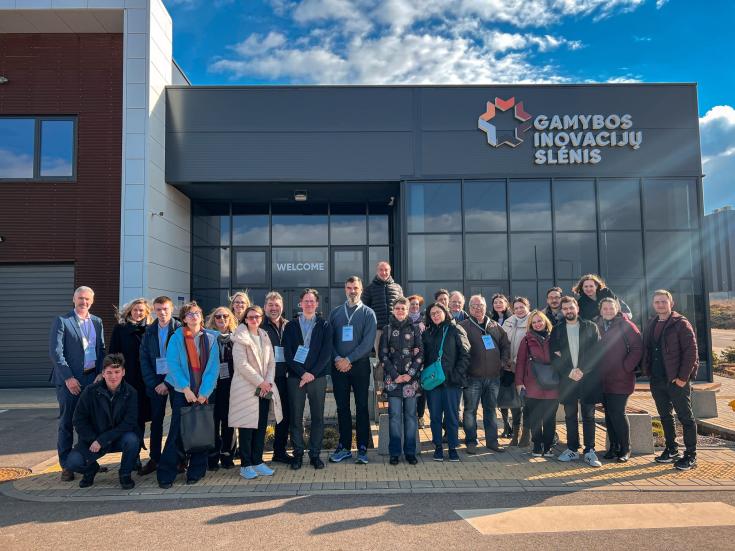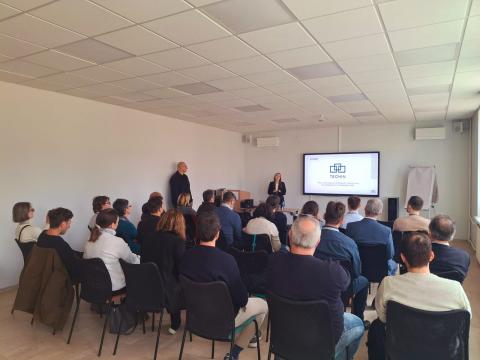SKYLA Meets in Vilnius to Boost Policy & Skills Innovation

Against the backdrop of spring in the Lithuanian capital Vilnius, the SKYLA project held its 5th partners meeting on April 8–9, bringing together policymakers, vocational training experts and education innovators from across Europe to explore policy innovation and vocational education transformation in support of the twin transition. The meeting was hosted by the European Social Fund Agency.
Over two intensive days in Vilnius, project partners engaged in strategic workshops, expert-led discussions, and field visits designed to strengthen interregional collaboration and accelerate progress on shared goals. At the heart of the meeting was a shared commitment: to develop more responsive, adaptable policy frameworks in vocational education and training (VET) that can meet the rapidly evolving demands of today’s labour markets and sustainability transitions.
|
Image
 |
Image
 |
Spotlight on Policy Change Mechanisms
The meeting opened with a deep dive into the SKYLA consortium’s work on Policy Change Alert Mechanisms—a cornerstone of the project. During Workshop 1, each partner presented their draft models, explaining how their mechanisms are designed to detect policy shifts, address emerging needs, and incorporate good practices and interregional insights. This was followed by Workshop 2, an interactive peer-review session where partners rotated through four small groups to critically assess and refine one another’s approaches. The format fostered dynamic exchange and highlighted the value of cross-border learning in shaping more effective and agile policy tools.
Study Visits Highlight Local Innovation Vilnius
One of the most anticipated parts of the meeting was a series of site visits and presentations that showcased Vilnius’ cutting-edge initiatives in vocational training and industrial transformation. The tour began with a visit to TECHIN – Vilnius Centre for Technology and Engineering Training, a flagship institution offering a unique blend of vocational training and industry-driven education. TECHIN is home to Lithuania’s first HVAC installation training academy, a space designed to upskill both beginners and advanced professionals through hands-on learning supported by 16 leading brands. Next, partners explored the Manufacturing Innovation Valley, a nationally recognized Digital Innovation Hub leading Lithuania’s digital transformation. Situated near major research and tech centres, the hub provides SMEs with vital support in adopting digital tools such as IoT, AI, and robotics. With 15 labs, including a state-of-the-art Virtual Twin Lab, the centre is positioning itself as a leader in Biointelligent manufacturing, blending biological systems with advanced engineering to shape the future of sustainable industry. These visits provided a vivid look at how Lithuania is translating innovation and education into impact, offering inspiration and practical models for other regions.
Expert Presentations on Day Two
The second day featured a series of expert presentations showcasing good practices and digital solutions in vocational education:
-
Julius Jakučinskas (Ministry of Education, Science and Sport of the Republic of Lithuania): provided policy insights for a Good Practice on integrating initial VET programme modules for primary and secondary school pupils.
- Zygimantas Lapienis, Aurimas Spiridonovas, Edmundas Baliukonis (Vilnius School of Auto Mechanics and Business): Demonstrated the practical implementation of VET modules through a success story from their Sectoral Practical Training Centre.
- Andrius Bečys (ESFA): provided more details on KURSUOK, a national one-stop digital platform helping adults access priority-aligned training. Reda Beržinskaitė (ESFA): Presented the Social Innovation Match (SIM) platform—an EU-wide database to promote and network social innovations in education and beyond.
- Prof. Paolo Federighi (EARLALL / University of Florence): Offered insights on disruptive policy innovation, calling for bold modernization of VET to meet the demands of the twin transition, echoing themes from the Draghi Report and the Union of Skills communication.
As the SKYLA partnership enters its next phase, the Vilnius meeting marked an important step forward. From policy deep-dives to practical insights from the field, the event underscored the project’s mission to connect regional strengths, exchange proven practices, and build resilient systems that can prepare Europe’s workforce for the challenges of tomorrow.
